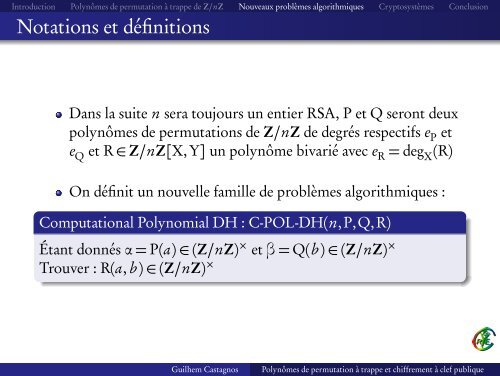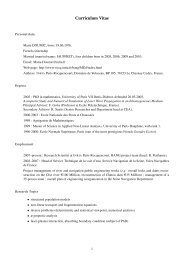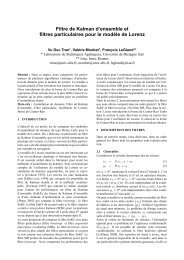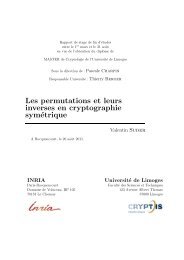Polynômes de permutation à trappe et chiffrement à clef publique
Polynômes de permutation à trappe et chiffrement à clef publique
Polynômes de permutation à trappe et chiffrement à clef publique
You also want an ePaper? Increase the reach of your titles
YUMPU automatically turns print PDFs into web optimized ePapers that Google loves.
Introduction <strong>Polynômes</strong> <strong>de</strong> <strong>permutation</strong> <strong>à</strong> <strong>trappe</strong> <strong>de</strong> Z/nZ Nouveaux problèmes algorithmiques Cryptosystèmes Conclusion<br />
Notations <strong>et</strong> définitions<br />
Dans la suite n sera toujours un entier RSA, P <strong>et</strong> Q seront <strong>de</strong>ux<br />
polynômes <strong>de</strong> <strong>permutation</strong>s <strong>de</strong> Z/nZ <strong>de</strong> <strong>de</strong>grés respectifs e P <strong>et</strong><br />
e Q <strong>et</strong> R ∈ Z/nZ[X,Y] un polynôme bivarié avec e R = <strong>de</strong>g X<br />
(R)<br />
On définit un nouvelle famille <strong>de</strong> problèmes algorithmiques :<br />
Computational Polynomial DH : C-POL-DH(n,P,Q,R)<br />
Étant donnés α = P(a) ∈ (Z/nZ) × <strong>et</strong> β = Q(b) ∈ (Z/nZ) ×<br />
Trouver : R(a, b) ∈ (Z/nZ) ×<br />
Guilhem Castagnos<br />
<strong>Polynômes</strong> <strong>de</strong> <strong>permutation</strong> <strong>à</strong> <strong>trappe</strong> <strong>et</strong> <strong>chiffrement</strong> <strong>à</strong> <strong>clef</strong> <strong>publique</strong>
















